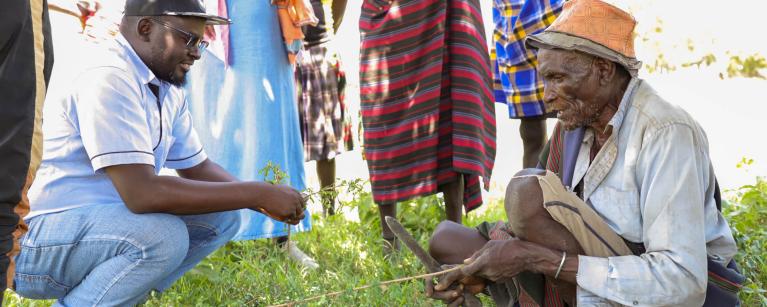Field visits are crucial for senior management, particularly in organizations like Oxfam, as they provide first-hand experience and understanding of the challenges and successes on the ground. These visits foster more informed decision-making and build stronger connections with staff, local partners and stakeholders, ensuring that strategies remain relevant to the realities of the communities being served.
Francis Shanty Odokorach, Country Director for Oxfam in Uganda, shares his reflections following the recent Country Management Team’s (CMT) project monitoring visit to the Stand-Up for Sexual Reproductive Health Rights (SRHR) project.
Interview with Francis Shanty Odokorach, The Country Director Oxfam in Uganda
Why is it important for the CMT to visit project areas?
It’s an important management and leadership practice. Recently, several new colleagues joined the country management team, and it's important that people who work for us understand where we have the most impact and the work dynamics. For example, when we're talking about welfare, the Human Resources Business Partner needs to have a fair understanding of what it takes to drive from Arua to Imvepi and back.
This experiential learning informs our decisions. For instance, in West Nile, we have been transitioning from a purely humanitarian arrangement to humanitarian and development. Seeing the situation firsthand helps us strategize how to reorganize our presence in the region effectively.
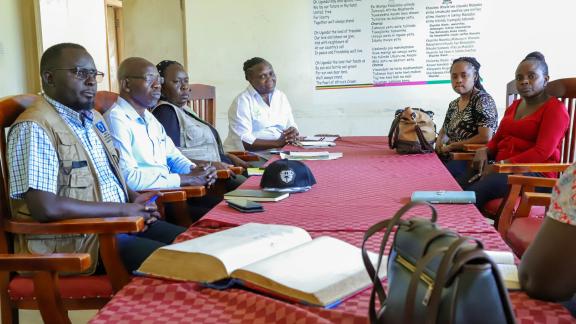
What are your cross-learnings from CMT's visits to Mt. Elgon, Karamoja, and West Nile?
Across the regions, there are some similarities, but there are also unique contexts. We try to understand this to inform our decision-making. The learning is that one shoe does not fit all.
In Karamoja, the focus is on getting children out of mines and into schools among other important objectives. While this is very contextualized for Karamoja, low school attendance affects other areas too.
This recent visit to the SRHR project just demonstrated that there is a big disaster happening in the communities, especially related to teenage pregnancy. However, our SRHR project is already showing a positive impact, like the primary school we visited, no student has dropped out due to pregnancy since the project began. This is a big departure from the ‘norm’ that was already there.
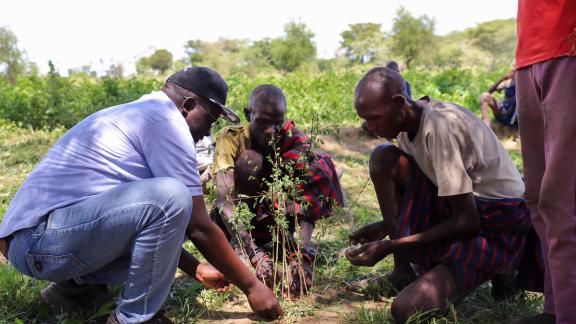
Cutting across is the issue of localization. For example, in Karamoja, humanitarian actors are promoting localization, just like in West Nile and Southwestern Uganda. We can proudly attribute this to Oxfam’s leadership in promoting the localization agenda, working closely with other stakeholders.
The Elgon region, on the other hand, is more about disaster risk reduction and some response. We learnt about importance of strengthening the resilience of the communities by integrating Disaster Risks Management in government planning processes. All this learning helps us develop context-specific projects that respond to the needs in those locations.
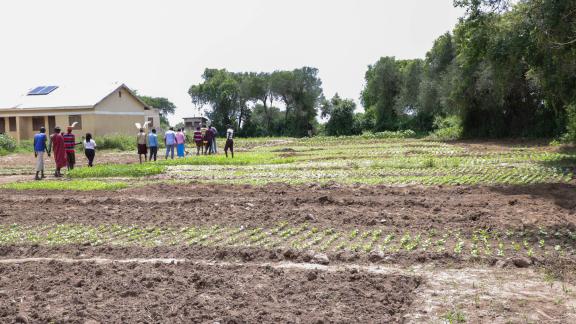
What has struck you from all these regions?
One thing that I really appreciate is Oxfam's choice of the partners. If you get it right in the selection of partners, you're likely to have a good impact on projects, and likewise, if the partners selected do not align with the values, ambitions, passion etc the projects will likely face sever challenges.
In the broader humanitarian spaces, we have been talking about the shrinking humanitarian funding and how it is affecting the refugee response. However, visiting Imvepi and actually seeing the impact of three out of seven health centers within the refugees settlement closed due to funding makes the call and advocacy for increased funding even more urgent. If the situation does not change, we are likely to see continued dropping in the indicators in other sectors like WASH and education.
For Karamoja, I was really struck by the work we are doing in transforming gender relations in households and how the use of gender action learning systems (GALS) sparks all positive indicators in terms of family development.
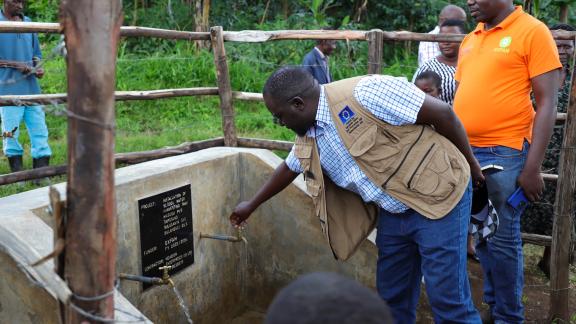
And then for Mbale – Elgon sub-region
The sheer difficulties of accessing some of the locations are just staggering. We went to one of these locations where it was just so draining to reach, and if the weather is not on your side, chances are that you might even spend a night there.
I have since appreciated more, the justification to service vehicles regularly, because such terrain will always cause heavy wear and tear on vehicles. Planning is at the core of effective delivery, however, timelines can still be affected by several factors other than planning.
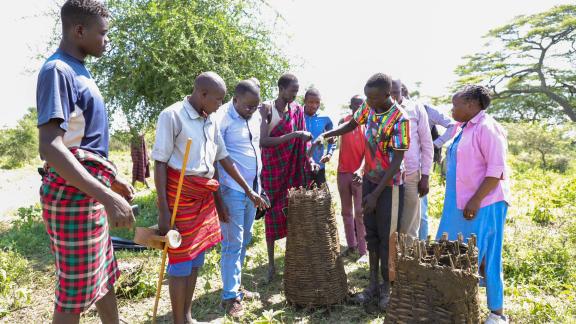
What changes have you observed in these regions?
In West Nile, it’s clear the refugee crisis isn’t going away soon, so we’re shifting from emergency response to building resilience. Karamoja, is opening more to the world compared to 15, 16 years ago. We are now seeing the role peace can bring to the region. I also observed that whatever contributions Oxfam made many years ago, the legacy still lives on there.
For example, the projects we implemented to protect and secure the land rights of pastoralists and pastoral communities seem to be paying off. This is, of course, credit to Oxfam, partners, and other actors who worked hard on land rights. Now, with investors coming in, because communities have secured communal land ownership, they are able to negotiate better
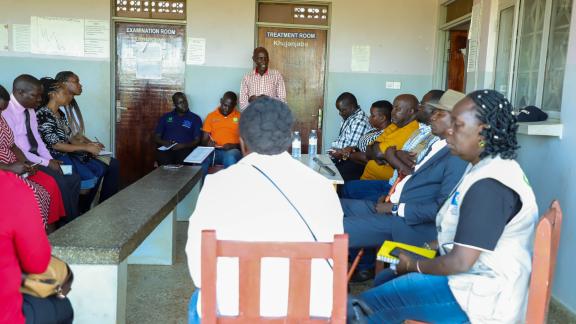
What are some of these changes that you were able to see in all the three regions from the time you began implementing them?
For West Nile, it's clear that the refugees are going nowhere. And therefore, a big shift in terms of moving away from emergencies to resilience and development.
For Karamoja, it's opening more to the world compared to 15, 16 years ago. We are now seeing the role peace can bring to the region and whatever contributions that Oxfam made many years ago, the legacy still lives on there.
When you talk about land rights; the projects we implemented to protect and secure land rights of pastoralists and pastoral communities come to mind. Now, with investors coming in, because they have secured communal land ownership, are able to negotiate better with the investors, mining companies, and are able to fetch some royalty. Had Oxfam not done that in the past, including influencing the national land policy, I don't think they would have had the opportunity to negotiate from a higher point.
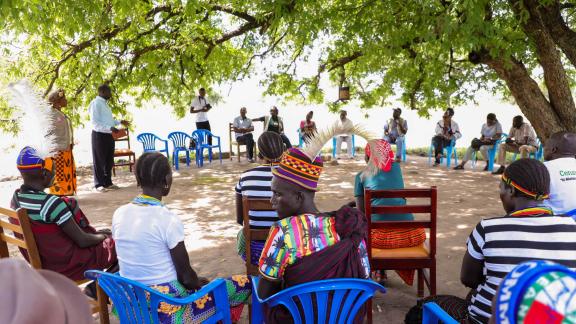
As for Mount Elgon:
My mind comes to this primary school where landslides killed some families and destroyed the WASH infrastructure in that school. The school was able to re-open because Oxfam set up the WASH facilities. It was a very difficult construction, up the hill and the slope but we had the support of the leaders and communities. So, I think it has gone a long way, particularly for keeping the girl child in school. Generally, I have observed impactful work, that is, restoring the dignity of the people especially those affected by disasters.
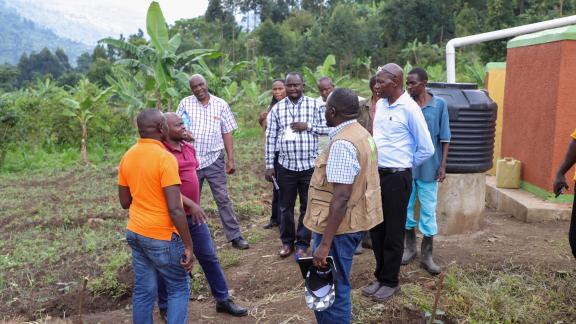
Any final thoughts?
Localization is crucial, and partnerships are key. This year, I’ve committed to strengthening partnerships, focusing on climate work, and improving staff welfare among other priorities.
When you see what is happening in the Elgon region, the stories of farmers in West Nile who have not had a good harvest, and the difficulties in predicting the weather patterns, I am reassured that these are areas we need to continue working on and not get tired of.
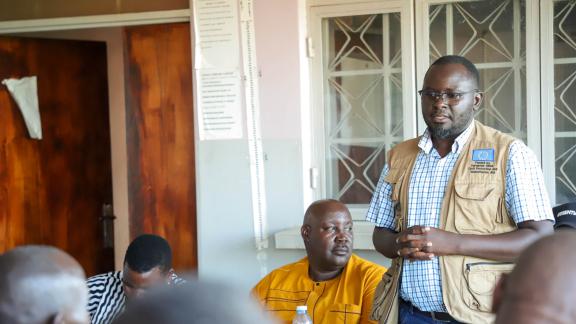
Additionally, the positive feedback on the new National Staff Terms and Conditions and how this has motivated staff shows we’re on the right track in supporting our teams, especially amidst the difficult contexts some are working in. I will still look back at the end of the year and see how much we have done in these three areas.
And finally, I feel lucky to lead a country program such as Uganda where people are very committed, and the stakeholders are very supportive.
